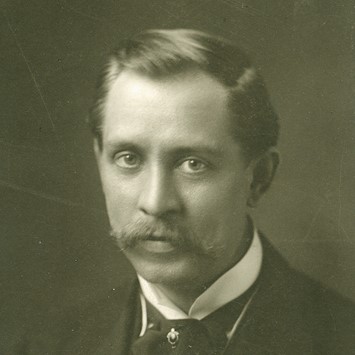Born November 11, 1872; Jülich, Germany
Died October 20, 1942; Chicago, Illinois
Frederick Stock began studying the violin with his father and won a scholarship to the Cologne Conservatory. He studied theory and composition under Engelbert Humperdinck, Franz Wüllner and Heinrich Zöllner, and upon his graduation in 1891, he joined the Gürzenich Orchestra Cologne.
In 1895, Theodore Thomas invited Stock to join the Chicago Orchestra as assistant principal viola. Four years later, he became assistant conductor. Following Thomas’s death in January 1905, Stock assumed conducting duties, and in April 1905, the board unanimously elected him as music director.
In November 1905, the Orchestra began performing at Ravinia Park and helped to inaugurate the first season of the Ravinia Festival in August 1936. In May 1916, Stock and the Orchestra made their first commercial recording: Mendelssohn’s Wedding March from the Incidental Music to A Midsummer Night’s Dream, released by the Columbia Graphophone Company.
Shortly after the U.S. entered World War I in 1917, the trustees encouraged Stock to finalize his citizenship. In August 1918, Stock made the decision to resign, asserting his loyalty to the U.S. By February 1919, it was reported that Stock “had complied with all the requirements of the law,” and the board’s executive committee unanimously resolved that he should resume his music directorship.
During the 1919–20 season, Stock inaugurated three major initiatives to cultivate future generations of musicians and concertgoers: a regular series of Children’s Concerts, Youth Auditions and the Civic Music Student Orchestra. He led the Orchestra’s first radio broadcast, under the auspices of WMAQ, transmitted in December 1925.
The Orchestra celebrated its 50th season in 1940–41, and Stock commissioned Stravinsky’s Symphony in C, Ganz’s Piano Concerto, Milhaud’s Symphony no. 1, Miaskovsky’s Symphony no. 21, Harris’s American Creed, Kodály’s Concerto for Orchestra, Glière’s Fête ferganaise Overture, Casella’s Symphony no. 3, Sowerby’s Symphony no. 3 and Walton’s Scapino Overture.
In 1941, Stock appointed Helen Kotas as principal horn, making her the first woman to hold a rostered position in the Chicago Symphony Orchestra and the first woman hired as principal of any section (except harp) in a major U.S. orchestra.
Stock served the Chicago Symphony Orchestra as music director for 37 years, longer than any other. Also an accomplished composer, he wrote numerous orchestral works — including a Violin Concerto premiered by Efrem Zimbalist and a Cello Concerto first performed by Alfred Wallenstein — and chamber works.


